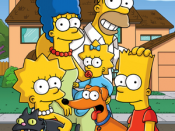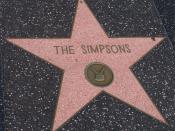Sociology � PAGE \* MERGEFORMAT �2�
Running Head: SOCIOLOGY: THE SIMPSONS
Sociology: The Simpsons�
Sociology: The Simpsons
Before The Simpsons premiered on Fox network in the fall of 1989, many sitcoms were rather bland and often suggested that real life families are "perfect". Matt Groening decided to develop a script that proving this stereotype is mistaken by creating a comedy that contained absurdity, sarcasm, exaggeration, and other comedic techniques. The author Brian L. Ott of ''I'm Bart Simpson, who the hell are you? A Study in Postmodern Identity (Re) Construction", verifies this claim by stating, "The Simpsons has always represented a sort of anti-show, spoofing, challenging, and collapsing the traditional codes, structures, and formulas of network television" (59).
The Simpsons satirizes all kinds of aspects of everyday life, family, television, religion and politics achieving the true essence of satire against the typical sitcoms that were on television during that time.
The principle of The Simpsons is above all to entertain its audience and make an impact in today's media by exposing stereotypes and satirizing aspects of mainstream cultures. John Alberti, the author of "Leaving Springfield" states, "The success of The Simpsons has proved enormously influential in shaping television programming" (10). The Simpsons also sparked the rise of many animated sitcoms on network television, "the raft of prime-time animation has appeared on cable television since then: Beavis and Butt-head, Daria, Ren and Stimpy, and more recently, South Park and Celebrity Deathmatch.
A great number of catch phrases that have originated from The Simpsons influenced other mediums to use these expressions. The simpsons is known for inventing new words, phrases, and abbreviations which also has popularized existing words and phrases by using some current words and phrases in new ways. The famous saying of Homer Simpson's "D'oh!" which is frequently said in...


